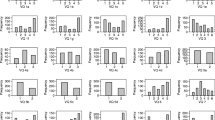Abstract
Quality of life may be considerably reduced in patients who are suffering from chronic lower limb venous insufficiency, although existing generic quality of life instruments (NHP, SF-36 or SIP) cannot completely identify their specific complaints. The Chronic Venous Insufficiency Questionnaire (CIVIQ) has been developed by iterative process. First, a pilot group of 20 patients was used to identify a number of important features of quality of life affected by venous insufficiency, other than physical symptoms of discomfort. A second study involving 2,001 subjects was used to reduce the number of items. Subjects were asked to score both the severity of their problems and the importance they attributed to each problem on a 5-point Likert scale. The importance items found in patients with venous insufficiency were subjected to factorial analyses (PCA, PAF). The final version is a 20-item self-administered questionnaire which explores four dimensions: psychological, physical and social functioning and pain. Internal consistency of the questionnaire was validated for each dimension (Cronbach's alpha > 0.820 for three out of four factors). Reproducibility was confirmed in a 60 patient test-retest study. Pearson's correlation coefficients for both the four dimension subscales and for the global score at 2-week intervals were greater than 0.940. Finally, the questionnaire was tested in a randomized clinical trial of 934 patients in order to assess responsiveness and the convergent validity of the instrument, together with the patient's own quality of life. This study demonstrated that convergence was valid: Pearson's correlation coefficients between clinical score differences and quality of life score differences were small (from 0.199–0.564) but were statistically different from 0 (p<0.001). Standardized response mean (SRM) and effect size (ES) were calculated to assess sensitivity to change. SRM and ES both demonstrated considerble responsiveness to change (>0.80). Reliability, face, content, construct validity and responsiveness were also determined for this specific quality of life questionnaire relating to venous insufficiency. Results suggest that this questionnaire may be used with confidence to assess quality of life in clinical trials on chronic venous insufficiency.
Similar content being viewed by others
Refernces
Nunnally JC. Psychometric Theory Second Edition, New York: McGraw-Hill, 1978.
McNeil BJ, Pauker SG. Incorporation of patient values in medical decision making. In: McNeil B, Cravalho E, eds. Critical Issues in Medical Technology. Auburn House 1982: 113–126.
Torrance GW, Feeny D. Utilities and quality-adjusted life years. Int J Tech Asses Health Care 1989; 5: 559–575.
Mehrez A, Gafni A. Quality-adjusted life years, utility theory, and healthy-years equivalents. Med Dec Making 1989; 9(2): 142–149.
Bergner M Bobbit RA, Carter WB et al. The Sickness Impact Profile: development and final revision of a health status measure. Med Care 1981; 19: 787–805.
Ware JE, Sherbourne CD. The MOS 36-Item short-form health survey (SF-36). I-Conceptual frameword and item selection. Med Care 1992; 30(6): 473–483.
Bucquet. D. Indicateur de santé perceptuel de Nottingham. Manuel d'utilisation INSERM, U 164, Montpellier 1988.
Launois R. L'insuffisance veineuse, retentissement sur la qualité de vie. In. Enjeux Médicaux, Sociaux et Economiques du Médicament en France, Paris: Centre de Recherches Internationales sur la Santé, 1991: 67–78.
Guyatt GH, Bombardier C, Tugwell PX. Measuring disease specific quality of life in clinical trials. Car Med Assoc J 1986; 134: 889–895.
Kleinbaum DG, Kuppes LL, Muller KE. In: Applied regression analysis and other multivariate methods. Boston: PSW-Kent 1986: 595–641.
Launois R. At the crossroads of venous insufficiency and hemorrhoidal disease: Daflon 500 mg repercussions of venous insufficiency on everyday life. Angiology 1994; 45(6,2): 495–504.
Launois R, Reboul-Marty J, Henry B. Construction et validation d'un indicateur spécifique de qualité de vie: le cas de l'insuffisance veineuse chronique des membres inférieurs. Journal d'Economie Médicale 1994; 12: 109–126.
Launois R. Construction et validation d'un indicateur de qualité de vie de l'insuffisance veineuse. In: Enjeux Médico-Sociaux et Economiques d'une Pathologie. Symposium de Bruxelles, Paris: Centre de Recherches Internationales sur la Santé, 1993: 57–63.
Reboul-Marty J. Résultats d'une enquête qualité de vie dans l'insuffisance veineuse des membres inférieurs. In: Enjeux Médico-Sociaux et Economiques d'une Pathologie. Sumposium de Bruxelles. Paris: Centre de Recherches Internationales sur la Santé, 1993: 65–71.
Cronbach LJ. Coefficient alpha in the internal structure of tests. Psychometria 1951; 16: 297–334.
Kirshner B, Guyatt G. A methodological framework for assessing health indices. J Chron Dis 1985; 38(1): 27–36.
Guyatt GH, Feeny D, Patrick DL. Measuring health-related quality of life. Ann Int Med 1993; 118(8): 622–629.
Liang MH, Fossel AH, Larson MG. Comparisons of five health status instruments for orthopedic evaluation. Med Care 1990; 28: 632–642.
Norman GR. Issues in the use of change scores in randomised trials. J Clin Epidemiol 1989; 42: 1097–1105.
Aussage P, Reboul-Marty J, Henry B, Launois R. Etude de la qualité de vie des patients insuffisants veineux traités par Daflon 500 mg en pratique quotidienne (rapport). ARCOS, Avril 1995.
Widmer LK. Peripheral venous disorders. Prevalence and social-medical importance. Observations in 4,529 apparently healthy persons. Basel, Study III.
Author information
Authors and Affiliations
Rights and permissions
About this article
Cite this article
Launois, R., Reboul-Marty, J. & Henry, B. Construction and validation of a quality of life questionnaire in Chronic Lower Limb Venous Insufficiency (CIVIQ). Qual Life Res 5, 539–554 (1996). https://doi.org/10.1007/BF00439228
Received:
Accepted:
Issue Date:
DOI: https://doi.org/10.1007/BF00439228




